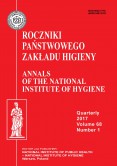Rocz Panstw Zakl Hig 1997, 48(1): 1-11
Proliferacja peroksysomów a proces hepatokancerogenezy
[Peroxisome proliferation and hepatocarcinogenesis]
ABSTRACT
Peroxisome proliferators are diverse group of chemicals which are regarded as rodent hepatocarcinogens and/or liver tumor promoters. These compounds when administered to rats and mice produce a dramatic increase in the size and number of hepatic peroxisomes and increase in activities of enzymes involved in beta-oxidation of fatty acids. Peroxisome proliferation is acompanied by hepatocyte proliferation and liver growth. The steroid hormone receptors superfamily have been identified that can be activated by peroxisome proliferators and are called Peroxisome Proliferator Activated Receptors (PPARs). It is therefore suggests that PPARs mediate the pleiotropic effects of peroxisome proliferators including enzyme induction, peroxisome proliferation, cell proliferation and hepatocarcinogenesis. Although the correlation of peroxisome proliferation and hepatocarcinogenesis is striking, the mechanism(s) by which this class of chemicals induce tumor is still understood; however several other hypothesis have been advanced. One is based on knowledge that hydrogen peroxide is produced during the increase in peroxisomal fatty acid oxidation. An excess of hydrogen peroxide can lead to oxidative stress (generation of reactive oxyden species), DNA damage and possibly to tumor initiation. In rodents, an alternative mechanism is the promotion of spontaneously initiated lesions by sustained cell proliferation. Thirdly, it is conceivable that sustained growth stimulation may be sufficient for tumor formation. Marked species differences are apparent in response to peroxisome proiiferators. Rats an mice are extremely responsive species, and hamsters show an intermediate response, while guinea pigs, monkeys and humans appear to be relatively non-responsive. In the light of these data it seems likely that risk to humans from peroxisome proiiferators may be overestimated. However, peroxiome proiiferators have shown to produce the other effects such as the suppression of hepatocyte apoptosis which could be an important factor in their hepatocarcinogenic response.
Downloads: 2447


